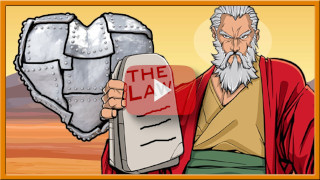Site last updated on April 19th, 2024.
Site last updated on April 19th, 2024.
Click on the quote below to read the article...

"A live-by-faith, work-for-God-not-money Christian community. We distribute Bible-based comics, videos, CDs, novels, and other tracts, and do free (voluntary) work. We are against hypocrisy and self-righteousness in the church; and we are in favour of honesty, humility and love."
- Details

Malcontents are easily confused with revolutionaries. Both types of people are dissatisfied with the present system. But malcontents do not have a positive alternative.
Malcontents listen to what the revolutionaries say, compliment them, and ask for more. But when they are offered a uniform and weapon, their true colours become apparent.
Malcontents make the common assumption that they need only prove everyone else wrong, and it makes them right by default. The appeal of the teachings of Jesus is that they can be used to prove everyone else wrong. But the truth is that the teachings of Jesus also prove the malcontents to be wrong.
There is only one way to become "right" and that is to start obeying those same teachings... something malcontents will never do.
Malcontents include loners with personality disorders who turn up at various denominational meetings long enough to find something to criticise, but who never stay around long enough to offer constructive support in overcoming the same problems that they criticise.
But we have noticed a lot of other forms of malcontent as well:
Protestants have earned their name by protesting against things they didn't like in the Catholic Church or in other protestant denominations. To their credit, they have at least succeeded in getting together another group. But often the primary message of the new group is just to tell you what is wrong with the others.
In our experience, the best examples of denominational malcontents in Australia are Baptists. Often their only way of relating to you is to ask what you think about everyone else: What do you think about Mormons? What's your opinion of the New Age movement? Where do you stand on Christadel-phians? and so on.
By keeping the spotlight on everyone else, they assume it exempts themselves from criticism.
This is the reasoning behind cult-busting. By constantly attacking others, they create an image of themselves as being spotless crusaders for truth. Cult-busters are little more than institutionalised malcontents.
Similarly, people who feel inspired to give us heresy tests ("What do you think about the Trinity? How is a person saved? Have you been filled with the Holy Spirit? Do you believe the Bible is the Word of God?") when they see us distributing tracts, are acting like the supervisor while we do the work.
We really don't owe them answers to any of these questions; rather, they should be the ones explaining to us why we should regard them as Christians. We are the ones out there taking the initiative in sharing our faith... not them.
Remember, it takes more than criticisms of us or other groups to make you right. Until such people can demonstrate in their own lives a better way to get the job done, we're really not interested.
(See also Loose Cannons.)
Register or log in to take the quiz for this article




















